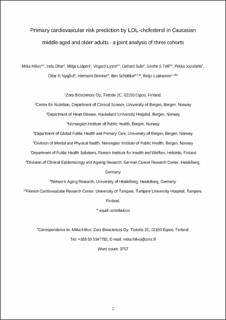Primary cardiovascular risk prediction by LDL-cholesterol in Caucasian middle-aged and older adults: a joint analysis of three cohorts
Hilvo, Mika; Dhar, Indu; Lääperi, Mitja; Lysne, Vegard; Sulo, Gerhard; Tell, Grethe S.; Jousilahti, Pekka; Nygård, Ottar Kjell; Brenner, Hermann; Schöttker, Ben; Laaksonen, Reijo
Journal article, Peer reviewed
Accepted version
Permanent lenke
https://hdl.handle.net/11250/2987656Utgivelsesdato
2022Metadata
Vis full innførselSamlinger
- Department of Clinical Science [2318]
- Registrations from Cristin [9791]
Originalversjon
European Journal of Preventive Cardiology (EJPC). 2022, 29 (3), e128–e137. https://doi.org/10.1093/eurjpc/zwab075Sammendrag
Aims
Low-density lipoprotein cholesterol (LDL-C) is an established causal driver of atherosclerotic cardiovascular disease (ASCVD), but its performance and age-dependency as a biomarker for incident events and mortality arising from ASCVD is less clear. The aim was to determine the value of LDL-C as a susceptibility/risk biomarker for incident coronary heart disease (CHD), ASCVD, and stroke events and deaths, for the age groups <50 and ≥50 years.
Methods and results
The performance of LDL-C was evaluated in three cohorts, FINRISK 2002 (n = 7709), HUSK (n = 5431), and ESTHER (n = 4559), by Cox proportional hazards models, C-statistics, and net reclassification index calculations. Additionally, the hazard ratios (HRs) for the three cohorts were pooled by meta-analysis. The most consistent association was observed for CHD [95% confidence interval (CI) for HRs per standard deviation ranging from 0.99 to 1.37], whereas the results were more modest for ASCVD (0.96–1.18) due to lack of association with stroke (0.77–1.24). The association and discriminatory value of LDL-C with all endpoints in FINRISK 2002 and HUSK were attenuated in subjects 50 years and older [HRs (95% CI) obtained from meta-analysis 1.11 (1.04–1.18) for CHD, 1.15 (1.02–1.29) for CHD death, 1.02 (0.98–1.06) for ASCVD, 1.12 (1.02–1.23) for ASCVD death, and 0.97 (0.89–1.05) for stroke].
Conclusion
In middle-aged and older adults, associations between LDL-C and all the studied cardiovascular endpoints were relatively weak, while LDL-C showed stronger association with rare events of pre-mature CHD or ASCVD death among middle-aged adults. The predictive performance of LDL-C also depends on the studied cardiovascular endpoint.
